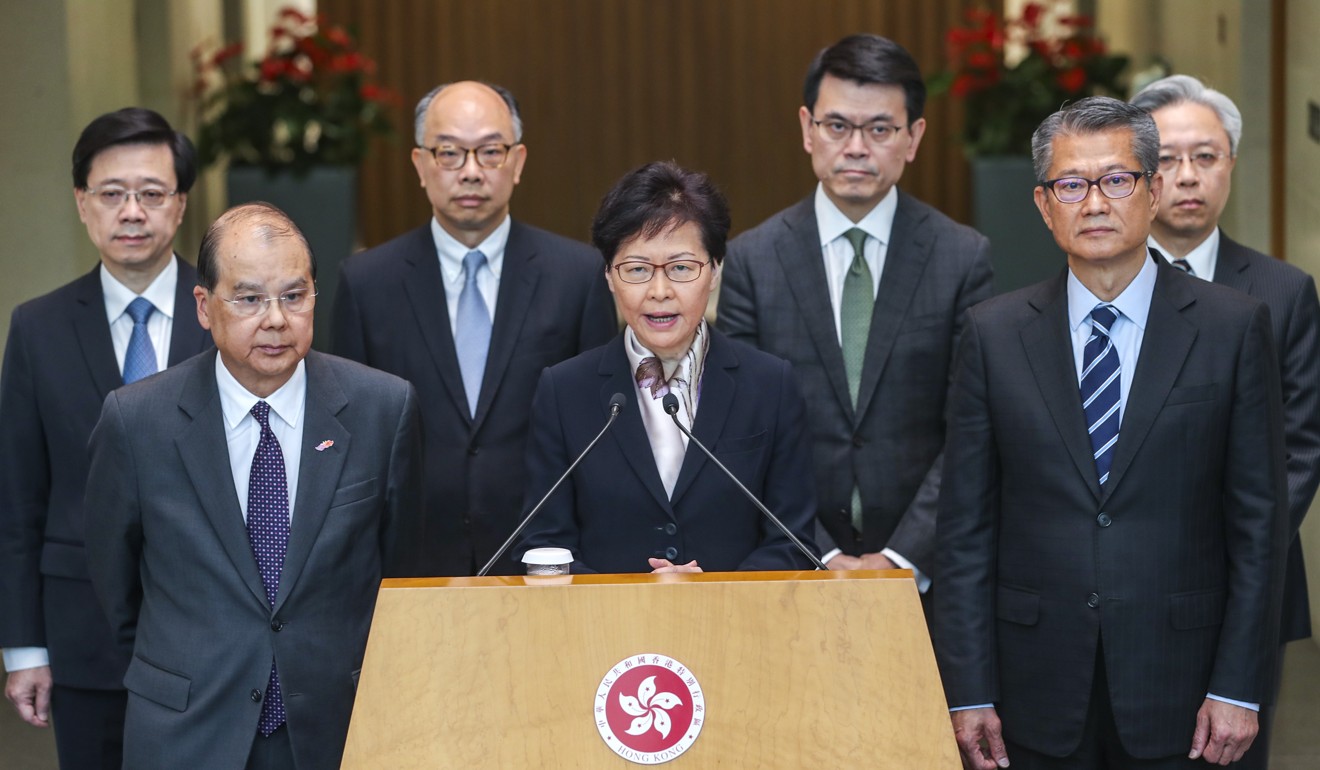
‘Be more like Trump’: academic advises Hong Kong government to change tactics in battle against fake news
- Political scientist Chan Wai-keung says US president sets tone for world media with Twitter use
- Hong Kong’s leaders have had to deny PLA involvement in clashes, suggestions of a curfew being enforced, and that Chief Executive Carrie Lam was on holiday
With no end in sight to anti-government protests in Hong Kong, Chief Executive Carrie Lam Cheng Yuet-ngor’s administration has now found itself struggling against the regular onslaught of fake news that spreads swiftly and widely online.
Officials have been forced to go on a blitz recently against misinformation and false news claiming, among other things, that a curfew was about to be imposed, that People’s Liberation Army soldiers were being deployed in disguise as Hong Kong police officers, and that Lam was taking a week-long holiday. One academic even said officials should learn from US President Donald Trump and use social media to fight back.
The latest rumour to prompt a denial by the government on Wednesday concerned claims that the justice minister had rejected a proposal by her right-hand man, the director of public prosecutions, to set up an “independent prosecution committee” to handle cases involving extradition bill protests.
Half a day after that made headlines on major online news platforms, the justice department issued a brief statement dismissing the news as “totally unfounded”.
Professor Leung Tin-wai, a veteran newsman and head of Shue Yan University’s department of journalism and communication, said: “The spread of fake news is a sign that the public is losing confidence in the government. People easily choose to believe rumours, especially those against the government.”
Agreeing, Professor Clement So York-kee, of the School of Journalism and Communication at Chinese University, said: “People rely too heavily on social media for information nowadays and tend to share it without thinking if it is too explosive to be true. So rumours can spread very quickly.”
Referring to recent online rumours that the director of immigration had taken leave to go on strike on Monday, and that PLA soldiers were disguised as Hong Kong police officers, he said: “This could have been a campaign by the anti-government side to undermine public confidence in the government, but it could not have stirred up so much noise if people had confidence in our government.”
Leung said officials need to appear in person at more press briefings to dismiss false news, instead of “hiding behind” written statements.

“I am not saying that the government is fighting a losing battle, but it has to take a higher profile to reject fake news,” he said.
Compared with government officials, the police appear to be more proactive in dismissing rumours concerning the force.
At the force’s daily press conference on Wednesday, three allegations by online users were dealt with, including the rumour about PLA soldiers.
Kong Wing-cheung, senior superintendent of the force’s public relations branch, showed reporters a screengrab of a video clip which internet users claimed showed police officers in riot gear speaking Mandarin – suggesting they were mainlanders.
“The fact is, the officers wearing gas masks cannot be heard clearly when they speak,” he said, dismissing the rumour they were PLA soldiers.
Kong also showed a picture of officers changing their clothes in the car park of a police station, and said: “Some people took this photo and accused our colleagues of preparing to do something dodgy. The fact is, they were working outside their district and could not go back. The police station was too crowded, so they changed at the car park and went home.”
The third allegation concerned a picture showing officers throwing something at protesters from inside a police station. Kong said it was tear gas – not fire crackers as was alleged. He said the officers did that to protect their colleagues on the ground from being attacked by protesters.

Political scientist Chan Wai-keung, from the Hong Kong Community College of Polytechnic University, said officials should take their cue from US President Donald Trump and use more social media to respond to issues.
“We are in the 21st century, but our officials still stick to the old ways inherited from colonial days to dispatch news, writing press releases in bureaucratic jargon which are not released before approval is secured from throughout the government hierarchy,” said Chan.
“They should learn from Trump. He basically dominates the world media through Twitter. His tweets are simple and to the point. His responses are prompt. You may not agree with what he says, but he sets the agenda of society with one or two lines of words.”


